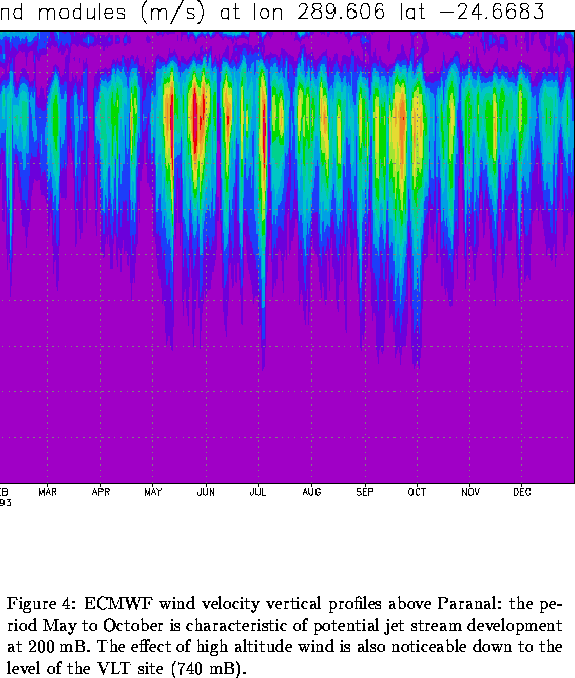


Next: Annexe: Workshop Agenda
Up: Forecasting Seeing
Previous: Forecasting Wavefront Isoplanaticity
Will the adaptive optics system be fast enough to follow the
wavefront temporal evolution?
The atmospheric seeing, expressed as the FWHM of
a long exposure image at an aberration free telescope
(FWHM  ) is the cumulative effect of
numerous sheets of refractive index perturbations
all the way from about 20 km altitude down to the telescope
enclosure (dome, mirror and instrument seeing are excluded
from this memo as they will be from the VLT observatory).
Each turbulence sheet at altitude h has its own r0(h)
and moves with the wind at a velocity v(h) in the direction
) is the cumulative effect of
numerous sheets of refractive index perturbations
all the way from about 20 km altitude down to the telescope
enclosure (dome, mirror and instrument seeing are excluded
from this memo as they will be from the VLT observatory).
Each turbulence sheet at altitude h has its own r0(h)
and moves with the wind at a velocity v(h) in the direction
 . If each sheet bears a fraction
. If each sheet bears a fraction  of
the total turbulence (as r0 varies as the 3/5 power
of the turbulence, we have
of
the total turbulence (as r0 varies as the 3/5 power
of the turbulence, we have ![$\alpha(h)= [\frac{r0}
{r0(h)}]^\frac{5}{3}$](img30.gif) ), the resultant wavefront corrugations
horizontal velocity at
ground level is
), the resultant wavefront corrugations
horizontal velocity at
ground level is
| ![\begin{displaymath}
V0=[\sum \alpha(h) \vec{v}(h)
^{\frac{5}{3}}]^{\frac{3}{5}}\end{displaymath}](img31.gif) |
(2) |
and the coherence time will be proportional to the time
needed for the wavefront to move by one coherence cell:
|  |
(3) |
It is thus clear from Fig. 7 that for a given
seeing vertical distribution V0 will be much larger -and  much
smaller- during austral winter. Moreover, 24-hour ECMWF predictions
of wind velocity would as such, even with the 46% error displayed
in Table 8, allow to classify the next night as
potentially slow or rapid. Moreover, considering the rather high correlation
coefficients given in Table 7, it is believed that a
statistical post-processing of the same type as described in Section 3.1 could
also recover part of the systematic forecast errors.
much
smaller- during austral winter. Moreover, 24-hour ECMWF predictions
of wind velocity would as such, even with the 46% error displayed
in Table 8, allow to classify the next night as
potentially slow or rapid. Moreover, considering the rather high correlation
coefficients given in Table 7, it is believed that a
statistical post-processing of the same type as described in Section 3.1 could
also recover part of the systematic forecast errors.
Table 7:
Averages of daily correlations, mean errors, and
mean absolute errors of radio sounding wind velocity against
ECMWF analysis and 24/48-hour forecast during the 1993 period.
The larger error at Quintero in 1993 is due
to the blacklisting of this station from the ECMWF data assimilation scheme
| 2||c|| |
|
2c||m/s |
|
|
| site & hour |
ECMWF |
corr |
err |
 err err  |
| Antofagasta |
Analysis |
0.918 |
-0.36 |
2.11 |
| 12GMT |
24h For. |
0.813 |
-3.36 |
4.31 |
| |
48h For. |
0.781 |
-0.24 |
5.09 |
| Quintero |
Analysis |
0.854 |
1.04 |
4.26 |
| 12GMT |
24h For. |
0.785 |
0.95 |
6.13 |
| |
48h For. |
0.748 |
1.05 |
7.24 |
Table 8:
Averages of daily relative unsigned errors of radio sounding
wind velocity against ECMWF analysis and 24/48-hour forecast during 1993
period and during the 1989-93 period. The larger error at Quintero in 1993 is due
to the blacklisting of this station from the ECMWF data assimilation scheme.
| |
2|c||Antofagasta |
2c||Quintero |
|
|
| |
1993 |
89-93 |
1993 |
89-93 |
| Analysis |
20% |
21% |
52% |
31% |
| 24h For. |
48% |
46% |
98% |
62% |
| 48h For. |
63% |
58% |
118% |
80% |




Next: Annexe: Workshop Agenda
Up: Forecasting Seeing
Previous: Forecasting Wavefront Isoplanaticity
Marc Sarazin
10/7/1997